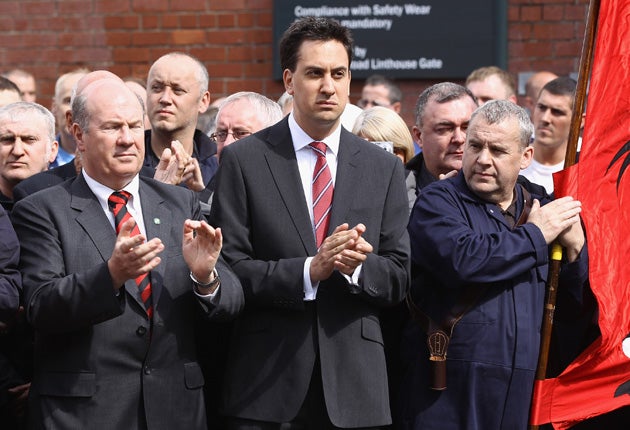Miliband plans to sever 'big money' ties with unions

Ed Miliband is to distance Labour from its trade union paymasters by diluting the party's financial dependence on them and reducing their role in electing the party leader.
Labour has proposed introducing a ceiling on donations to any political party which could be as low as £500, The Independent has learnt. The move could break the long-running deadlock between the parties on agreeing a new system of financing politics.
Previous attempts to halt big donations have failed, partly because Labour was reluctant to give up its multimillion-pound gifts from the unions. But Mr Miliband is ready to gamble on Labour attracting thousands of small donations from individual supporters as part of a drive to take "big money" out of politics.
He also wants to change Labour's culture by allowing the public a vote when the party chooses its leader. He plans to give 25 per cent of the votes to non-party members who register as Labour supporters. MPs, trade unionists and party members would also each have a quarter of the votes in Labour's electoral college. At present, MPs, union and party members each have a third of those votes.
Mr Miliband's moves are bound to cause tensions with the unions. They are all the more surprising because he depended on union support to defeat his brother, David, for the Labour leadership in September.
The shake-up of party finances has been suggested in Labour's evidence to the Committee on Standards in Public Life, which is holding an inquiry into the issue. With Mr Miliband's backing, Ray Collins, Labour's general secretary, has told the committee in a letter: "While some argue for a cap of £50,000, a much lower cap of around £500 would be more equitable, democratic and less susceptible to avoidance." Labour sources say the party is ready to negotiate on a cap of between £500 and £50,000 in a new round of talks with the Tories and Liberal Democrats.
Unions contribute more than 80 per cent of Labour's funding, after many of its wealthy backers stopped giving following the "cash for honours" affair which engulfed the Blair government.
One reform option would be to treat Labour's income from union members who pay the political levy as individual donations. This helps to fund the party's day-to-day spending. But a ceiling would stop Labour appealing for big one-off union donations – notably at election times.
Mr Collins made clear that Labour still wants to keep its union link: "Any proposals should be respectful of the different traditions, backgrounds and structures of the various political parties. Party funding reform should not be used as a means to alter the institutional constitutional arrangements of individual political parties."
Shadow Cabinet allies of Mr Miliband deny that he wants a symbolic break with the unions in order to tackle the "Red Ed" image painted by the Tories. They say he is serious about modernising his party and is prepared to approve bold reforms – including a campaign to emulate Barack Obama by attracting small donors via the internet.
The Liberal Democrats and Labour may back a new deal on financing politics, which includes increased public funding. Nick Clegg's party had to make 20 staff redundant after losing taxpayer-funded grants to opposition parties when it entered the Coalition.
Options include a "pound for pound" system where the state would match small donations raised by the parties – perhaps up to £20 – or allowing people to make a £3-a-year donation by ticking a box on their tax form. Another proposal is to grant special tax status to political donations, like the "gift aid" scheme for charities.
The Tories worry that increasing state funding would provoke public hostility, but have supported a £50,000 cap on donations – which would end big gifts from supporters such as Lord Ashcroft, the party's former treasurer.
Unions are wary of Mr Miliband's proposals. Len McCluskey, the new general secretary of Unite, warned Mr Miliband not to weaken the unions' influence. "If anybody is attempting to sever the link with the unions, we will oppose that. This is our party," he told Tribune newspaper. "What Ed needs to understand is that the trade union movement created the Labour Party. If there are people who just see us as a cash cow, the dotty aunt and uncle who are... just brought out to sign cheques, then that's not going to happen. We want to make certain that our views and beliefs are listened to."
Join our commenting forum
Join thought-provoking conversations, follow other Independent readers and see their replies
Comments
Bookmark popover
Removed from bookmarks